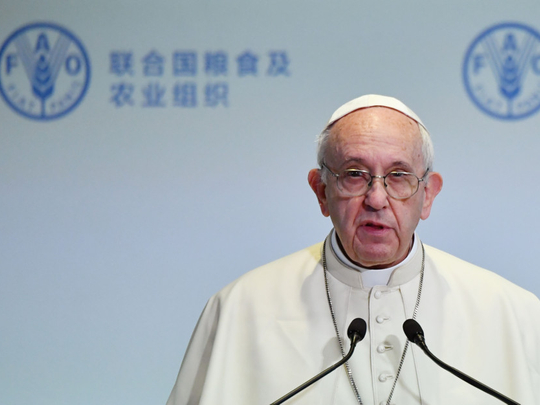
By Joanna Moorhead
Pope Francis has condemned the death penalty many times during the almost five years of his papacy: but this week, he made an even more significant move when he signalled that he would change church teaching to make it inadmissible . The death penalty was, he said, “an inhuman measure that humiliates human dignity, in whatever form it is carried out”, and it “is, of itself, contrary to the Gospel ... God alone is the true judge and guarantor”.
Human life, he said, “is always sacred”: that’s a line Catholic leaders are very keen on, of course, but usually in connection with abortion, which it vehemently opposes. Liberal Catholics have long argued that the church should be as vociferous on other aspects of taking life as it is on abortion: what will be most surprising to many about the news from Rome is that the Catholic catechism — its central statement of faith and belief — still, in its 1992 edition, allows for the death penalty in certain circumstances. Abortion is not allowed under any circumstances.
But if it sounds uncontroversial enough for man on Earth to be condemning killing, think again. A US survey last year found that 43% of American Catholics back the death penalty — not as high as the 69% of white evangelicals, it is true, but a significant minority who will inject yet more discontent into the ranks of the church, under the Argentinian pontiff who, while he’s undoubtedly top of the popes in the wider world, is an increasingly divisive figure among his own followers.
Conservative Catholics are already bristling over suggestions that he is in favour of — or at least prepared to turn a blind eye to — the giving of holy communion to divorced and remarried Catholics. Those who were happy that many of the more far-reaching reforms promised by Vatican II in the 1960s never came to fruition are worried now: there is talk that Francis is taking up where Pope Paul VI left off, after two much more conservative pontiffs, John Paul II and Benedict XVI. Francis is less interested than either of them in cracking the whip from Rome, is far more interested in leading by example than by the book, and seems a lot more prepared to devolve power to national bishops and priests on the ground. For those who love to cling to the safety of dogma and tradition - and there are many of them in the church pews — this is scary stuff.
Where Francis does believe in nailing his colours to the mast is often on precisely the issues the traditionalists wish he’d keep quiet about. The death penalty, for some, will be one: but more controversially still, talk is now swirling in Rome that Francis means to overturn Catholic teaching on the just war theory. He has already made statements that, for example, “faith and violence are incompatible”, and has spoken out many times against war. Devised by St Augustine, modified by St Thomas Aquinas, and debated by philosophers and thinkers down through the centuries, this set of conditions under which war can “justly” be fought underpins the whole world’s, and not merely the Catholic church’s, acceptance that killing is admissible in certain circumstances.
If Francis decides to change Catholic teaching on that, he will put the cat well and truly among the pigeons, not only inside his own church (can a Catholic be in the armed forces, if the Pope says war is always wrong?), but also across the whole world, which will have to reconsider the basis of why wars are ever fought, and whether it is ever right for any group of human beings to take up arms against another. The ripples from the fallout of that debate are likely to be truly awesome.
— Guardian News & Media Ltd
Joanna Moorhead writes on family and parenting for the Guardian








